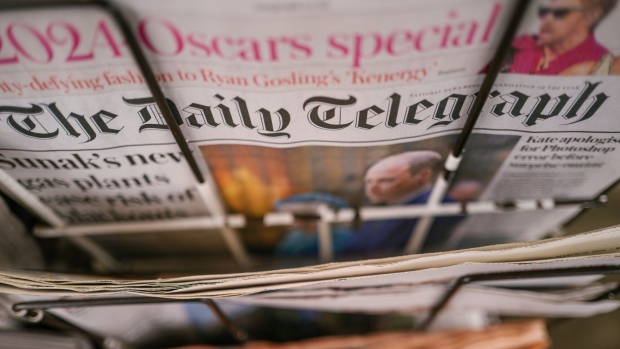Mar 15, 2024
RedBird IMI’s £600 Million Telegraph Dream Starts to Crumble
, Bloomberg News

(Bloomberg) -- Four months after RedBird IMI emerged as the frontrunner for the Telegraph newspaper and Spectator magazine, its hopes of owning the titles outright are looking remote.
The United Arab Emirates-backed investment vehicle is now considering stepping away from a deal that created a political storm and led UK Prime Minister Rishi Sunak’s government to this week pledge an effective ban on foreign states and their officials acquiring print news media.
“We expect RedBird IMI will rapidly withdraw from the ongoing regulatory clearance process,” Alice Enders, director of research at Enders Analysis, said in a note.
RedBird IMI declined to comment. The firm is now in limbo - stuck with the Telegraph’s debt but facing a future where it may never be allowed to actually own the titles. It hasn’t said when it will make a final decision, but other buyers for the media group are waiting on the sidelines.
Money Talks
RedBird IMI’s difficulties are a marker of the sway the Spectator and Telegraph hold in Westminster, where they are widely considered mouthpieces of the Conservative Party. The prospect of a change in ownership has reopened Brexit-era fault lines in the party, with the growing disquiet among politicians ultimately leading the government to scupper the takeover.
“Money talks and ownership matters,” Conservative peer Michael Forsyth said in the House of Lords this week. “The very idea of an autocratic state with a poor record on human rights owning or holding any influence in a major British daily newspaper to me is just utterly surreal.”
In November, RedBird IMI obtained an option to take control of the titles after it agreed to a loan package with the Barclay family, who owned the publications for almost two decades. The vehicle, run by former CNN chief Jeff Zucker, agreed to lend the Barclay family £600 million ($750 million), secured against the titles. Separately, Abu Dhabi’s International Media Investments lent a further £600 million secured against other Barclay family businesses and commercial interests.
RedBird IMI is a joint venture between US-based RedBird Capital Partners and IMI — a private investment vehicle for UAE Deputy Prime Minister Sheikh Mansour bin Zayed Al Nahyan, who’s made a number of acquisitions in the UK in recent years.
The vehicle, which has always emphasized IMI would be a passive investor only, said in a statement earlier this week that it was “extremely disappointed” by the proposed curbs on foreign media control, saying it would “now evaluate our next steps, with commercial interests continuing to be the sole priority.”
UAE Surprise
The UAE was surprised by the furore its involvement caused given IMI’s passive role in the Zucker vehicle, according to two people familiar with the matter. The reaction has caused upset at senior levels of its government.
The involvement of former Conservative Party ministers such as George Osborne is now viewed by some as a mistake, given their divisive reputation for some in the party, the people said, while asking not to be named given the sensitive topic. Former Chancellor of the Exchequer Osborne assisted RedBird IMI in his role at investment bank Robey Warshaw.
The outrage stands in marked contrast to the UK’s courting of UAE money in other areas.
RedBird IMI’s Sheikh Mansour, who is a brother of UAE President Sheikh Mohammed bin Zayed Al Nahyan, owns Manchester City FC and oversees sovereign wealth fund Mubadala Investment Co. — a state-backed investor that signed an investment partnership with the UK government in 2021. The UAE committed £10 billion to Britain as part of that agreement.
Mubadala is considering an investment Heathrow airport, Bloomberg News reported last month, and previously took a stake in UK’s CityFibre, which provides broadband infrastructure. Another UAE state-backed firm, Emirates Telecommunications Group Co., is the biggest shareholder in Vodafone Group Plc, though the UK government said in January that the stake posed a national security risk and ordered the companies to take steps to mitigate it.
Last year, UAE renewable energy firm Masdar said it’s taking a stake in an £11 billion offshore wind farm.
The UK is also negotiating a free trade deal with the Gulf Cooperation Council, of which the UAE is a member. The sixth round of talks concluded last month.
Complex Deal
Despite RedBird’s bruising experience, any fresh auction of the Telegraph titles is likely to spark plenty of interest.
Investors from hedge fund billionaire Paul Marshall to Jonathan Harmsworth’s Daily Mail & General Trust Plc have been jostling to join any further sale process. But they too will face their own challenges.
“A trade buyer like the Daily Mail is more likely to raise competition issues,” said Tom Smith, a competition lawyer at Geradin Partners and former legal director of the Competition and Markets Authority. “The regulatory process could get very complicated and take up to a year.”
--With assistance from Alex Wickham, Adveith Nair, Paul Wallace and Jamie Nimmo.
©2024 Bloomberg L.P.






